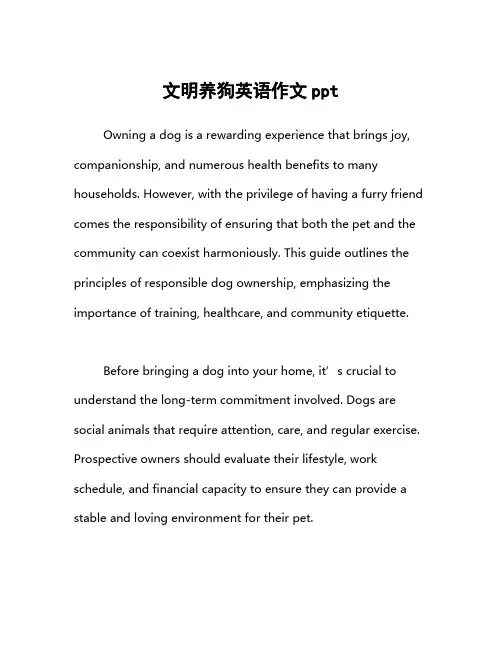宠物话题 英语演讲PPT
- 格式:pptx
- 大小:1.58 MB
- 文档页数:8






文明养狗英语作文pptOwning a dog is a rewarding experience that brings joy, companionship, and numerous health benefits to many households. However, with the privilege of having a furry friend comes the responsibility of ensuring that both the pet and the community can coexist harmoniously. This guide outlines the principles of responsible dog ownership, emphasizing the importance of training, healthcare, and community etiquette.Before bringing a dog into your home, it’s crucial to understand the long-term commitment involved. Dogs are social animals that require attention, care, and regular exercise. Prospective owners should evaluate their lifestyle, work schedule, and financial capacity to ensure they can provide a stable and loving environment for their pet.Selecting a breed that matches your living situation and activity level is essential. Some breeds require more exercise and space, while others are content with a more sedentary lifestyle. Researching breed characteristics and consulting with veterinarians or breed-specific rescue organizations can help potential owners make an informed decision.Proper training and socialization are the cornerstones of a well-behaved dog. Training should begin early and be consistent, using positive reinforcement techniques. This not only teaches the dog basic commands but also helps in establishing a bond between the pet and owner.Teaching basic commands such as sit, stay, come, and heel can prevent undesirable behaviors and ensure the dog’s safety. Enrolling in obedience classes can provide structured learning and socialization opportunities with other dogs and people.Exposing the dog to various environments, sounds, people, and other animals is crucial for developing a well-rounded temperament. Regular socialization can prevent fearfulness and aggression, making the dog more adaptable and less stressed in new situations.Maintaining a dog’s health involves regular veterinary check-ups, vaccinations, and a balanced diet. Preventative healthcare is essential for early detection and treatment of potential health issues.Annual veterinary visits are necessary to monitor the dog’s health, update vaccinations, and address any concerns. Vaccinations protect against common diseases and contribute to overall public health by preventing the spread of zoonotic diseases.A balanced diet tailored to the dog’s age, size, and activity level is crucial. High-quality commercial dog food or a veterinarian-approved homemade diet can ensure the dog receives all necessary nutrients. Avoid feeding dogs table scraps or foods toxic to them, such as chocolate, grapes, and onions.Dogs require regular physical exercise and mental stimulation to maintain their physical and psychological well-being. Lack of exercise can lead to obesity and behavioral problems.The amount and type of exercise needed vary by breed and age. Activities can include walking, running, playing fetch, and agility training. Providing a safe, enclosed area where the dog can run freely is beneficial.Mental stimulation can be achieved through interactive toys, puzzle feeders, training sessions, and social interactions.Engaging a dog’s mind can reduce boredom and destructive behaviors.Responsible dog ownership extends beyond the home and into the community. Owners should be mindful of local regulations and respectful of public spaces.Adhering to leash laws and keeping dogs under control in public spaces is essential for the safety of the dog and others. Leashes prevent accidents and confrontations with other dogs and people.Picking up after your dog is a basic courtesy and a legal requirement in many areas. Carrying waste bags and disposing of them properly helps maintain a clean environment and prevents the spread of disease.Excessive barking can be a nuisance to neighbors. Training dogs to bark only when necessary and addressing underlying causes of excessive barking, such as boredom or anxiety, can mitigate this issue.Choosing to adopt from shelters or rescues supports the reduction of pet overpopulation. If breeding is considered, it should be done responsibly with a focus on health, temperament, and breed standards.Adopting a dog from a shelter or rescue organization can save a life and provide a loving home for an animal in need. Shelters often have dogs of all ages and breeds, including purebreds.If choosing to breed, it’s vital to prioritize the health and well-being of both the parent dogs and their offspring. Responsible breeders conduct health screenings and adhere toethical breeding practices to ensure the quality and health of the puppies.Responsible dog ownership requires dedication, education, and a commitment to the well-being of both the pet and the community. By understanding the responsibilities involved and adhering to best practices in training, healthcare, and community etiquette, dog owners can ensure a harmonious and fulfilling relationship with their canine companions. Embracing these principles not only enhances the quality of life for the dog but also fosters a positive environment for all.。




